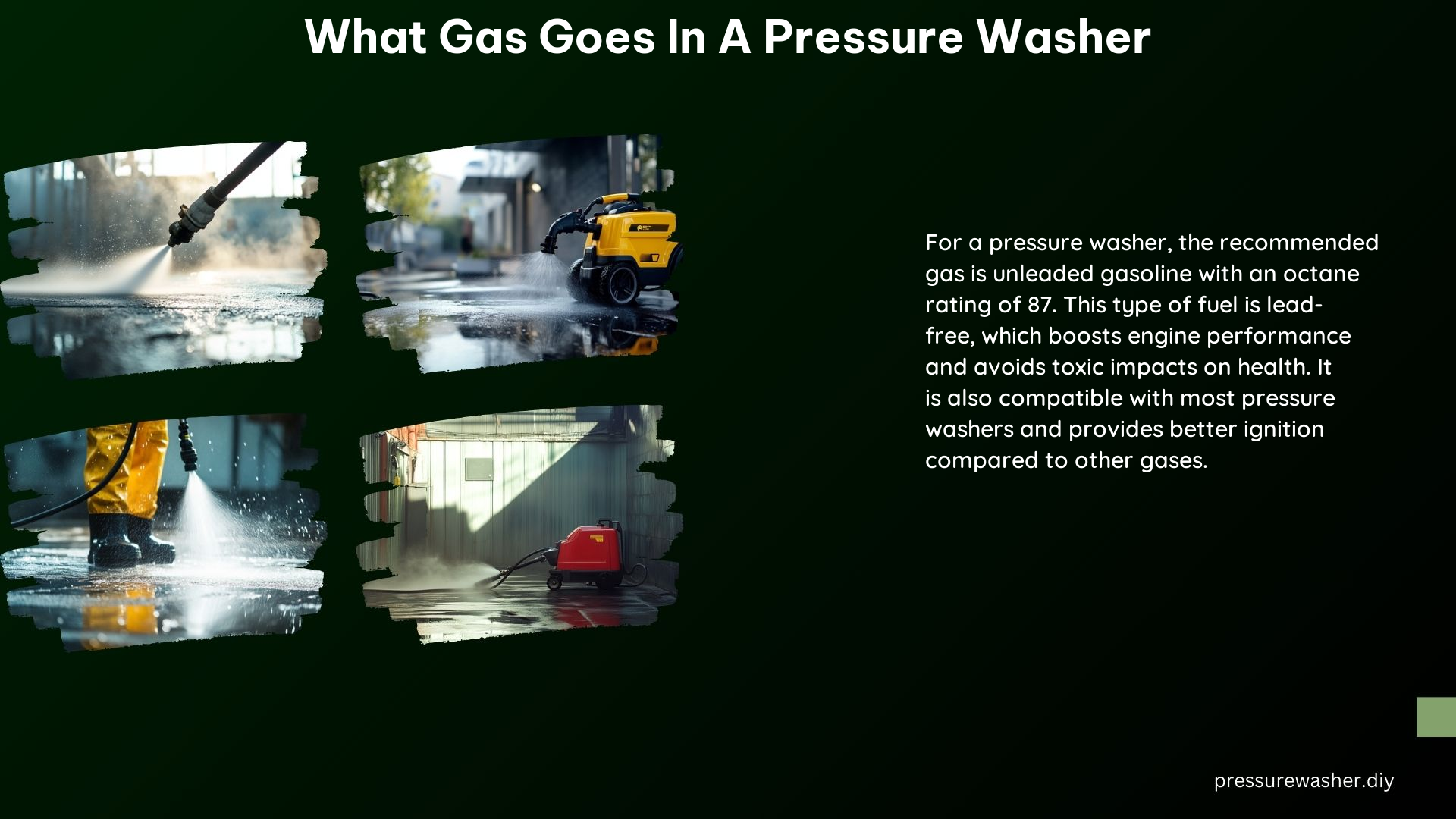When it comes to choosing the right gas for your pressure washer, there are several options to consider. This comprehensive guide will provide you with the technical details and key considerations to help you make an informed decision on the best fuel for your pressure washer.
Types of Gas for Pressure Washers
1. Unleaded Gasoline
Unleaded gasoline is the most commonly recommended fuel for pressure washers. It has an octane rating of 87, which is the standard for most small engines, and is widely available at gas stations across the country. Unleaded gasoline is lead-free, making it a safer and more environmentally friendly option. It is also compatible with the majority of pressure washers and provides reliable engine performance.
Technical Specifications:
– Octane Rating: 87
– Ethanol Content: Up to 10%
– Advantages: Widely available, compatible with most pressure washers, lead-free, and provides good engine performance.
– Disadvantages: May be prone to moisture absorption and fuel degradation over time, especially if stored for extended periods.
2. Ethanol-Free Gasoline
Ethanol-free gasoline is recommended by some users and mechanics, particularly for long-term storage and engine health. This type of fuel is less prone to moisture absorption, which can lead to issues such as carburetor clogs, fuel line blockages, and engine damage. However, ethanol-free gas may be more difficult to find and can be more expensive than regular unleaded gasoline.
Technical Specifications:
– Octane Rating: 87-93 (depending on the specific product)
– Ethanol Content: 0%
– Advantages: Reduced risk of moisture-related issues, better for long-term storage, and can improve engine performance.
– Disadvantages: May be more expensive and harder to find than regular unleaded gasoline.
3. Premium Gasoline
While premium gasoline has a higher octane rating, typically 91 or 93, it does not necessarily mean it is ethanol-free. Some users and mechanics recommend premium gasoline for its higher quality and fewer impurities, but it may not provide significant benefits for most pressure washers. The higher octane rating is primarily beneficial for high-performance engines, which pressure washers generally do not have.
Technical Specifications:
– Octane Rating: 91-93
– Ethanol Content: Varies (can be up to 10% or ethanol-free)
– Advantages: Higher quality and fewer impurities, which may improve engine performance and longevity.
– Disadvantages: More expensive than regular unleaded gasoline, and the higher octane rating may not provide significant benefits for most pressure washers.
4. Diesel Fuel
Diesel fuel is not typically used in pressure washers, as they are designed to run on gasoline. However, some hot water pressure washers may be compatible with diesel fuel. It’s important to note that there are different types of diesel fuel, including manufacturer diesel, off-road diesel, and bio-diesel. Bio-diesel is not recommended for use in pressure washers due to its potential to cause issues.
Technical Specifications:
– Cetane Rating: Typically 40-55
– Fuel Type: Diesel (not recommended for most pressure washers)
– Advantages: Can be used in some hot water pressure washers.
– Disadvantages: Not compatible with the majority of pressure washers, and bio-diesel can cause problems.
Key Considerations

Ethanol Content
Most pressure washers can safely use gasoline with up to 10% ethanol content. However, using ethanol-free gas can be beneficial for long-term storage and engine health, as ethanol can attract moisture and lead to issues such as carburetor clogs and fuel line blockages.
Octane Rating
An octane rating of 87 is sufficient for most pressure washers. Higher octane ratings, such as 91 or 93, may not provide significant benefits and are generally not necessary for these types of engines.
Fuel Storage
Gasoline should not be stored for more than 30 days, as it can degrade and lead to engine problems. If you need to store fuel for longer periods, use a fuel stabilizer and keep the container in a cool, dry place.
Manufacturer Recommendations
Always check your pressure washer’s owner’s manual for the manufacturer’s specific fuel recommendations. Some manufacturers may have preferences or requirements regarding the type of gas to be used.
Safety Tips
- Use the Correct Fuel: Ensure you use the recommended fuel type and octane rating for your pressure washer to avoid engine damage or performance issues.
- Store Fuel Properly: Keep fuel in well-ventilated areas, away from heat sources, and in airtight containers to prevent evaporation and contamination.
- Maintain Your Pressure Washer: Regularly inspect and maintain your pressure washer to prevent engine problems and ensure optimal performance.
- Use Fuel Stabilizers: If you need to store gasoline for an extended period, add a fuel stabilizer to help prevent degradation and maintain engine health.
Technical Specifications Summary
- Octane Rating: 87 (for most pressure washers)
- Ethanol Content: Up to 10% (for most pressure washers)
- Fuel Type: Unleaded gasoline or ethanol-free gasoline
- Fuel Storage: Store in airtight containers, away from heat sources, and in well-ventilated areas.
